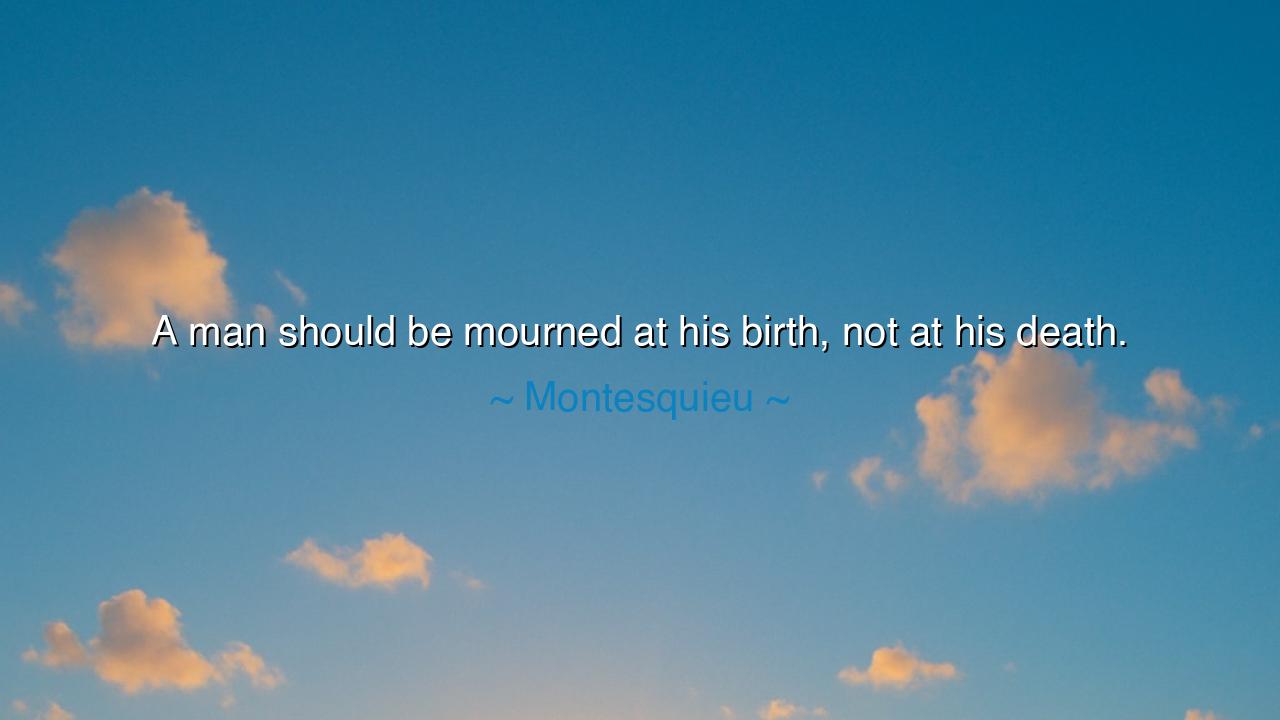
A man should be mourned at his birth, not at his death.






"A man should be mourned at his birth, not at his death." — so spoke Montesquieu, the philosopher of reason and the observer of the human heart. In this paradoxical saying lies a truth both solemn and sublime. It overturns the common view of life and death, teaching us that the true sorrow lies not in the end of existence, but in its beginning — for to be born is to enter a world of struggle, uncertainty, and toil, while to die is to return to rest. The words are not a call to despair, but a meditation on the condition of humankind, and on the fragile beauty of our mortal passage through this earth.
The meaning of this quote dwells in the idea that life, though precious, is also burdened with suffering. When Montesquieu says that a man should be mourned at his birth, he means that to live is to step into the realm of imperfection — into a world where pain, loss, and longing are inseparable from joy. The newborn, though greeted with smiles, unknowingly begins a journey through hardship and decay. Yet when that same soul departs the world, he is no longer tormented by its cruelties; he has found release, a return to the eternal stillness from which he came. Thus, the philosopher mourns not the departure, but the descent — not the end of the soul’s voyage, but the beginning of its exile.
Montesquieu’s thought reflects the wisdom of the ancients, who often saw life and death as a cycle, not an opposition. The Stoics, like Seneca and Epictetus, taught that death is not evil, but natural — that fear of it enslaves the mind, while acceptance frees it. The philosopher Heraclitus declared that life and death are but two aspects of one eternal rhythm, as fire turns to smoke and smoke back to air. Montesquieu, writing in the 18th century, inherited this vision. He looked upon the world with both reverence and realism, knowing that human existence is noble precisely because it is fleeting. His words remind us that wisdom begins when we cease to worship life blindly and learn instead to live it consciously, with courage and compassion.
There is a story that echoes this truth in the life of Buddha. When Siddhartha Gautama was born, wise men came to his father and said, “Your son will either be a great king or a great saint.” Yet one sage, upon seeing the child, wept. When asked why, he replied, “I weep for him, because he will know suffering.” And so it was: Siddhartha, sheltered in luxury, one day saw the sickness, aging, and death that awaited all beings. His mourning became his awakening. He left his palace to seek freedom from the cycle of pain — and in finding enlightenment, he confirmed the very truth Montesquieu would later speak: that to be born is to enter a world of sorrow, and to die is to transcend it.
But let us not mistake Montesquieu’s wisdom for cynicism. To say that birth deserves mourning is not to condemn life, but to call us to live it wisely. For if life is difficult, then every act of goodness is all the more heroic. To be kind in a cruel world, to love in a world of loss, to hope amid uncertainty — these are triumphs greater than any conquest of empires. The philosopher mourns the burden of life so that we may cherish its blessings. He teaches that we cannot remove suffering from the human condition, but we can choose to walk through it with grace.
The lesson is this: do not cling to life in fear of death, and do not mourn death in fear of losing life. Accept both as divine companions on the same road. Let the knowledge of mortality make you tender, not bitter; grateful, not greedy. When you see a child born, rejoice in the potential of goodness, but also remember the sacred responsibility that life carries. And when you see someone die, do not despair — for perhaps they have laid down their burden and gone home at last.
So, my child, remember: the soul is like a traveler who leaves a quiet shore to sail upon stormy seas. We weep when he departs, for we know the waters will be rough. But when his voyage is done and he returns to peace, we should not weep, but bow our heads in reverence. For as Montesquieu reminds us, life is the struggle, and death the rest. Let us therefore live with dignity, knowing that sorrow and joy are the twin threads of our brief tapestry — and when the final day comes, may we greet it not with fear, but with gratitude, for the journey we were given to walk beneath the sun.






AAdministratorAdministrator
Welcome, honored guests. Please leave a comment, we will respond soon